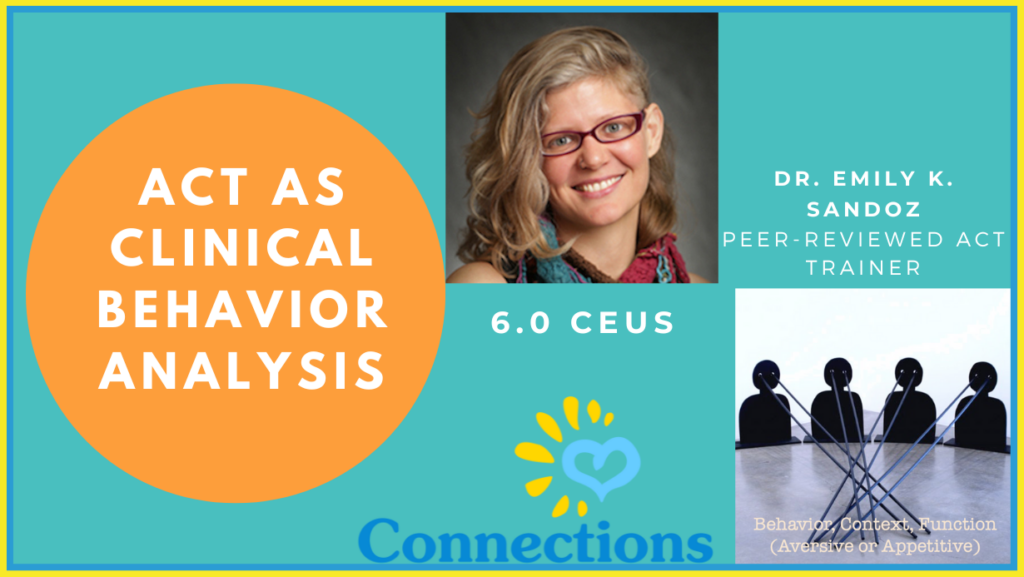Connections Behavior Planning and Intervention welcomes Dr. Emily Sandoz, PhD, and former Editor in Chief of the Journal of Contextual Behavior Analysis! In this event, Dr. Sandoz facilitates a number of experiential exercises to demonstrate in-session ACT-based analysis and intervention.
About the Presenter
Emily Sandoz, PhD, is former Editor-In-Chief of the Journal of Contextual Behavioral Science, the Director of the Louisiana Contextual Science Research Group, and the Emma Louise LeBlanc Burguieres/BORSF Endowed Professor of Social Sciences at the University of Louisiana at Lafayette, Psychology Department. She has co-authored three books on acceptance and commitment therapy for struggles with eating and body image, along with chapters and journal articles on ACT, values, the therapeutic relationship, and psychological flexibility. Emily has led more than 40 professional training workshops around the world, and serves as a peer-reviewed ACT trainer.
Abstract
Acceptance and Commitment Therapy (ACT) is defined, not topographically in terms of techniques or exercises, but functionally in terms of its focus on building flexibility into the behavioral repertoire (through whatever techniques or exercises work to do so). Often, however, ACT training involves didactic descriptions of flexibility linked to experiential training of techniques and exercises. This makes functional mastery with creative and sensitive generativity difficult, as the number of exemplars necessary for such is higher than that to which many have easy access. An alternative approach to ACT mastery involves experiential training in ACT as clinical behavior analysis. That is, training in the direct clinical applications of functional contextual philosophy and behavior analytic theory, which naturally extends into flexible, process- based implementation of ACT. In this way, creativity, sensitivity, and generativity are directly targeted in the therapist repertoire. This two-part webinar offers an experiential return to the philosophical and theoretical roots of ACT, and, working from solid foundations, practice toward mastery.
Learning Objectives
- Attendees will describe three clinical implications of functional contextualism for language-based behavioral intervention.
- Attendees will describe three clinical implications of clinical behavior analysis for language-based behavioral intervention.
- Attendees will describe potential clinical behavior analytic interventions based on analyses of context, behavior, and functional relationship between context and behavior.
- Attendees will analyze language-based behavioral interventions by tracking context, behavior, and functional relationships between context and behavior.
- Attendees will describe potential clinical behavior analytic interventions based on analyses of aversive and appetitive control.
- Attendees will analyze talk therapy interventions based by tracking behaviors under aversive and appetitive control.
- Attendees will describe the psychological flexibility model of psychological well-being and intervention in mid-level and behavioral terms.
- Attendees will demonstrate interventions that manipulate immediate conditions to build psychological flexibility.
Number of CEU’s available: 6.0 BACB CEU’s
Cost to Attend: $119.99 (includes registration and CEU’s)
For questions, challenges with registration, or any other needed information, please contact Dusty, Director of Continuing Education and ACE Coordinator for CBPI, LLC, at continuingeducation@connections-behavior.com.
Connections Behavior Planning & Intervention, LLC, is a BACB-Approved ACE Provider (Provider # OP-17-2781). The BACB does not directly sponsor or endorse this event, its speakers, or its content.
AUGUSTSALE
Login to Register
Please log in or register before registering for On-Demand items.

